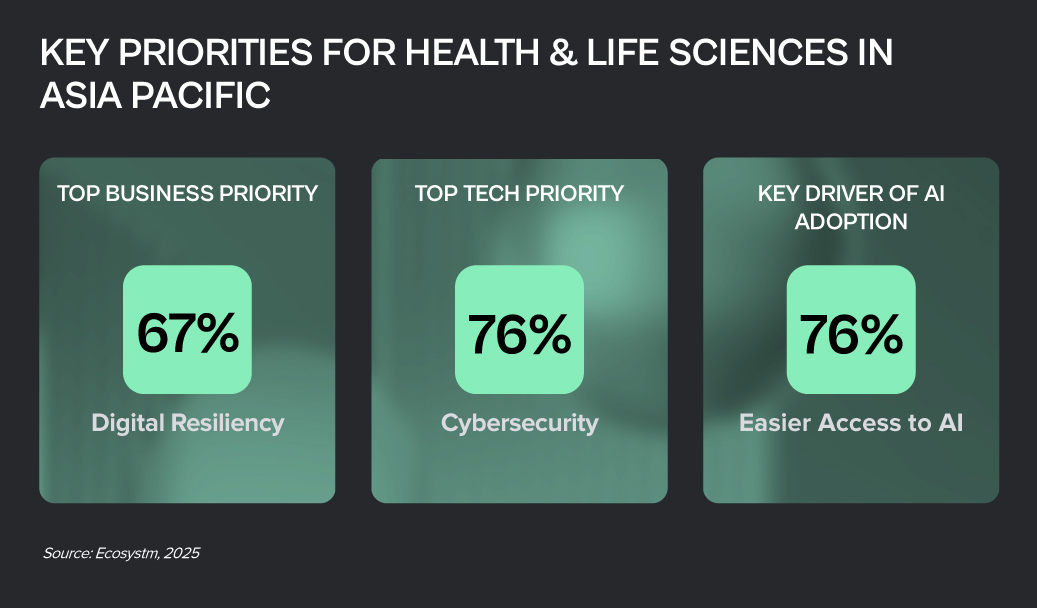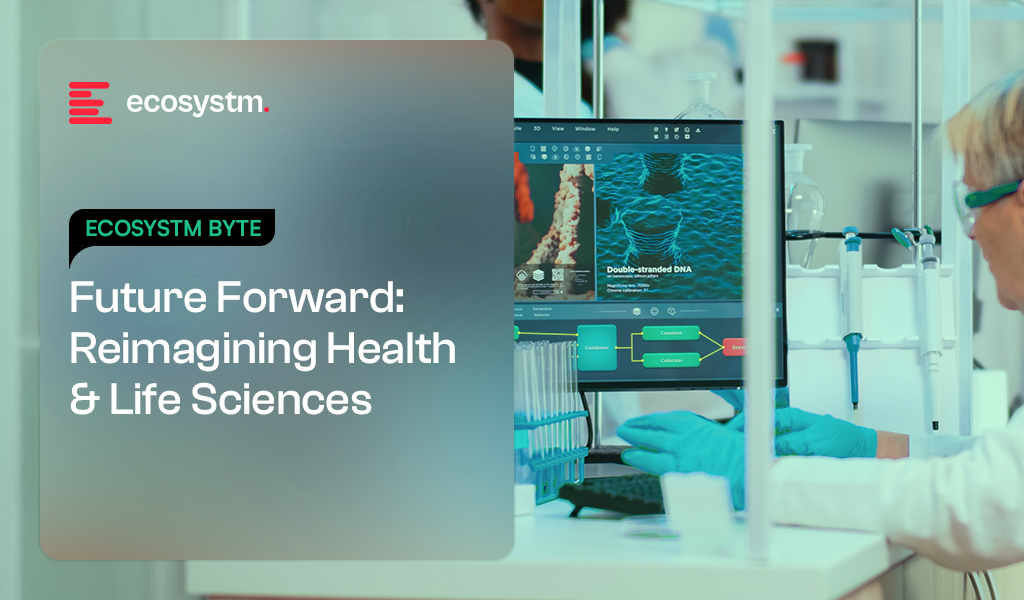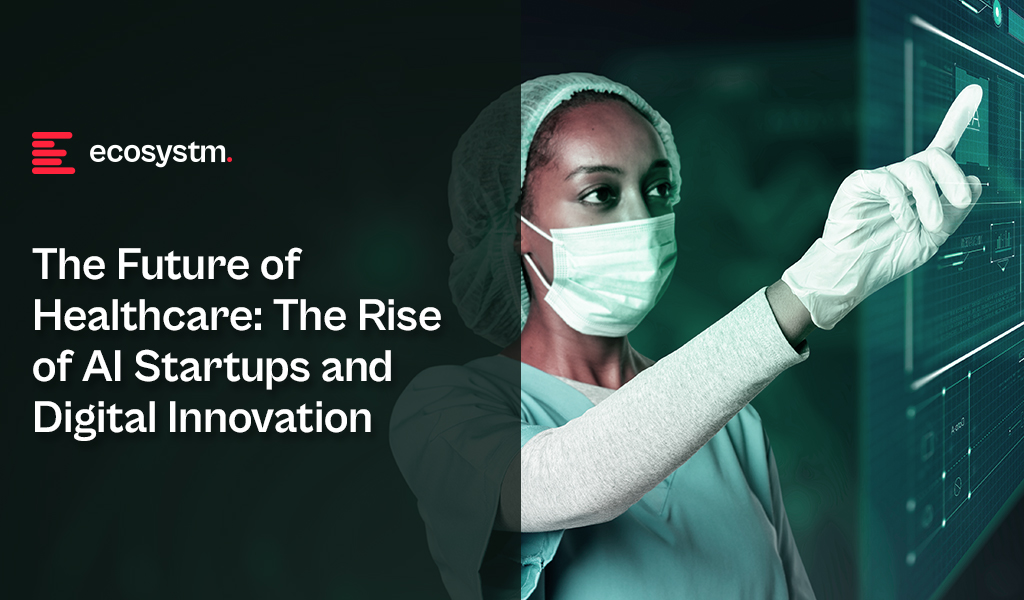Advanced technology and the growing interconnectedness of devices are no longer futuristic concepts in health and life sciences – they’re driving a powerful transformation. Technology, combined with societal demands, is reshaping drug discovery, clinical trials, patient care, and even our understanding of the human body.
The potential to create more efficient, personalised, and effective healthcare solutions has never been greater.

Click here to download “Future Forward: Reimagining Health & Life Sciences” as a PDF.
Modernising HR for Enhanced Efficiency & Employee Experience
The National Healthcare Group (NHG), a leading public healthcare provider in Singapore, recognised the need to modernise their HR system to better support 20,000+ healthcare professionals and improve patient services.
The iConnect@NHG initiative was launched to centralise HR functions, providing mobile access and self-service capabilities, and streamlining workflows across NHG’s integrated network of hospitals, polyclinics, and specialty centres.
The solution streamlined HR processes, giving employees easy access to essential data, career tools, and claims. The cloud-based platform improved data accuracy, reduced admin work, and integrated analytics for better decision-making and engagement. With 95% adoption, productivity and job satisfaction surged, enabling staff to focus on care delivery.
Automating Workflows for Better Patient Outcomes
Gold Coast Health handles a high volume of patient interactions across a wide range of medical services. The challenge was to streamline operations and reduce administrative burdens to improve patient care.
The solution involved automating the patient intake process by replacing paper forms with electronic versions, freeing up significant staff time.
A new clinical imaging solution also automates the uploading of wound images and descriptions into patient records, further saving time. Additionally, Gold Coast Health implemented a Discharge to Reassess system to automate follow-ups for long-term outpatient care. They are also exploring AI to simplify tasks and improve access to information, allowing clinical teams to focus more on patient care.
Streamlining Operations, Improving Care
IHH Healthcare, a global provider with over 80 hospitals across 10 countries, faced a fragmented IT landscape that hindered data management and patient care.
To resolve this, IHH migrated their core application workloads, including EMRs, to a next-gen cloud platform, unifying data across their network and enhancing analytics.
Additionally, they adopted an on-prem cloud solution to comply with local data residency requirements. This transformation reduced report generation time from days to hours, boosting operational efficiency and improving patient and clinician experiences. By leveraging advanced cloud technologies, IHH is strengthening their commitment to delivering world-class healthcare.
Creating Seamless & Compassionate Patient Journeys
The Narayana Health group in India is committed to providing accessible, high-quality care. However, they faced challenges with fragmented patient data, which hindered personalised care and efficient interactions.
To address this, Narayana Health centralised patient data, providing agents with a 360-degree view to offer more informed and compassionate service.
By automating tasks like call routing and form-filling, the organisation reduced average handling times and increased appointment conversions. Additionally, automated communication tools delivered timely, sensitive updates, strengthening patient relationships. The initiative has improved operational efficiency and deepened the organisation’s patient-centric focus.
Reimagining Location Services for Digital Healthcare
Halodoc, a leading digital health platform in Indonesia, connects millions of users with healthcare professionals and pharmacies.
To improve key services like home lab appointments and medicine delivery, Halodoc sought a more cost-effective and secure location service.
The transition resulted in an 88% reduction in costs for geocoding and places functionalities while enhancing data security. With better performance monitoring, Halodoc processed millions of geocoding and place requests with no major issues. This migration not only optimised costs but also resolved long-standing technical challenges, positioning Halodoc for future innovation, including machine learning and AI. The move strengthened their data security and provided a solid foundation for continued growth and high-quality healthcare delivery across Indonesia.
Driving Efficiency & Accessibility through Integrated Systems
Lupin, a global pharma leader, aimed to boost patient care, streamline operations, and enhance accessibility. By integrating systems and centralising data, Lupin wanted seamless interactions between patients, doctors, and the salesforce.
The company implemented a scalable infrastructure optimised for critical business applications, backed by high-performance server and storage technologies.
This integration improved data-driven decision-making, leading to optimised operations, reduced costs, and improved medicine quality and affordability. The robust infrastructure also ensured near-zero downtime, enhancing reliability and efficiency. Through this transformation, Lupin reinforced its commitment to providing patient-centred, affordable healthcare with faster, more efficient outcomes.
Leveraging AI for Cloud Security
Mitsubishi Tanabe Pharma’s “VISION 30” seeks to deliver personalised healthcare by 2030, focusing on precision medicine and digital solutions. The company is investing in advanced digital technologies and secure data infrastructure to achieve these goals.
To secure their expanding cloud platform, the company adopted a zero-trust model and enhanced identity management.
A security assessment identified gaps in cloud configuration, prompting tailored security improvements. GenAI was introduced to translate and summarise security alerts, reducing processing time from 10 minutes to just one minute, improving efficiency and security awareness across the team. The company is actively exploring further AI-driven solutions to strengthen security and drive their digital transformation, advancing the vision for personalised healthcare.

Healthcare delivery and healthtech have made significant strides; yet, the fundamental challenges in healthcare have remained largely unchanged for decades. The widespread acceptance and integration of digital solutions in recent years have supported healthcare providers’ primary goals of enhancing operational efficiency, better resource utilisation (with addressing skill shortages being a key driver), improving patient experience, and achieving better clinical outcomes. With governments pushing for advancements in healthcare outcomes at sustainable costs, the concept of value-based healthcare has gained traction across the industry.
Technology-driven Disruption
Healthcare saw significant disruptions four years ago, and while we will continue to feel the impact for the next decade, one positive outcome was witnessing the industry’s ability to transform amid such immense pressure. I am definitely not suggesting another healthcare calamity! But disruptions can have a positive impact – and I believe that technology will continue to disrupt healthcare at pace. Recently, my colleague Tim Sheedy shared his thoughts on how 2024 is poised to become the year of the AI startup, highlighting innovative options that organisations should consider in their AI journeys. AI startups and innovators hold the potential to further the “good disruption” that will transform healthcare.
Of course, there are challenges associated, including concerns on ethical and privacy-related issues, the reliability of technology – particularly while scaling – and on professional liability. However, the industry cannot overlook the substantial number of innovative startups that are using AI technologies to address some of the most pressing challenges in the healthcare industry.
Why Now?
AI is not new to healthcare. Many would cite the development of MYCIN – an early AI program aimed at identifying treatments for blood infections – as the first known example. It did kindle interest in research in AI and even during the 1980s and 1990s, AI brought about early healthcare breakthroughs, including faster data collection and processing, enhanced precision in surgical procedures, and research and mapping of diseases.
Now, healthcare is at an AI inflection point due to a convergence of three significant factors.
- Advanced AI. AI algorithms and capabilities have become more sophisticated, enabling them to handle complex healthcare data and tasks with greater accuracy and efficiency.
- Demand for Accessible Healthcare. Healthcare systems globally are striving for better care amid resource constraints, turning to AI for efficiency, cost reduction, and broader access.
- Consumer Demand. As people seek greater control over their health, personalised care has become essential. AI can analyse vast patient data to identify health risks and customise care plans, promoting preventative healthcare.
Promising Health AI Startups
As innovative startups continue to emerge in healthcare, we’re particularly keeping an eye on those poised to revolutionise diagnostics, care delivery, and wellness management. Here are some examples.
DIAGNOSTICS
- Claritas HealthTech has created advanced image enhancement software to address challenges in interpreting unclear medical images, improving image clarity and precision. A cloud-based platform with AI diagnostic tools uses their image enhancement technology to achieve greater predictive accuracy.
- Ibex offers Galen, a clinical-grade, multi-tissue platform to detect and grade cancers, that integrate with third-party digital pathology software solutions, scanning platforms, and laboratory information systems.
- MEDICAL IP is focused on advancing medical imaging analysis through AI and 3D technologies (such as 3D printing, CAD/CAM, AR/VR) to streamline medical processes, minimising time and costs while enhancing patient comfort.
- Verge Genomics is a biopharmaceutical startup employing systems biology to expedite the development of life-saving treatments for neurodegenerative diseases. By leveraging patient genomes, gene expression, and epigenomics, the platform identifies new therapeutic gene targets, forecasts effective medications, and categorises patient groups for enhanced clinical efficacy.
- X-Zell focuses on advanced cytology, diagnosing diseases through single atypical cells or clusters. Their plug-and-play solution detects, visualises, and digitises these phenomena in minimally invasive body fluids. With no complex specimen preparation required, it slashes the average sample-to-diagnosis time from 48 hours to under 4 hours.
CARE DELIVERY
- Abridge specialises in automating clinical notes and medical discussions for physicians, converting patient-clinician conversations into structured clinical notes in real time, powered by GenAI. It integrates seamlessly with EMRs such as Epic.
- Waltz Health offers AI-driven marketplaces aimed at reducing costs and innovative consumer tools to facilitate informed care decisions. Tailored for payers, pharmacies, and consumers, they introduce a fresh approach to pricing and reimbursing prescriptions that allows consumers to purchase medication at the most competitive rates, improving accessibility.
- Acorai offers a non-invasive intracardiac pressure monitoring device for heart failure management, aimed at reducing hospitalisations and readmissions. The technology can analyse acoustics, vibratory, and waveform data using ML to monitor intracardiac pressures.
WELLNESS MANAGEMENT
- Anya offers AI-driven support for women navigating life stages such as fertility, pregnancy, parenthood, and menopause. For eg. it provides support during the critical first 1,001 days of the parental journey, with personalised advice, tracking of developmental milestones, and connections with healthcare professionals.
- Dacadoo’s digital health engagement platform aims to motivate users to adopt healthier lifestyles through gamification, social connectivity, and personalised feedback. By analysing user health data, AI algorithms provide tailored insights, goal-setting suggestions, and challenges.
Conclusion
There is no question that innovative startups can solve many challenges for the healthcare industry. But startups flourish because of a supportive ecosystem. The health innovation ecosystem needs to be a dynamic network of stakeholders committed to transforming the industry and health outcomes – and this includes healthcare providers, researchers, tech companies, startups, policymakers, and patients. Together we can achieve the longstanding promise of accessible, cost-effective, and patient-centric healthcare.
















